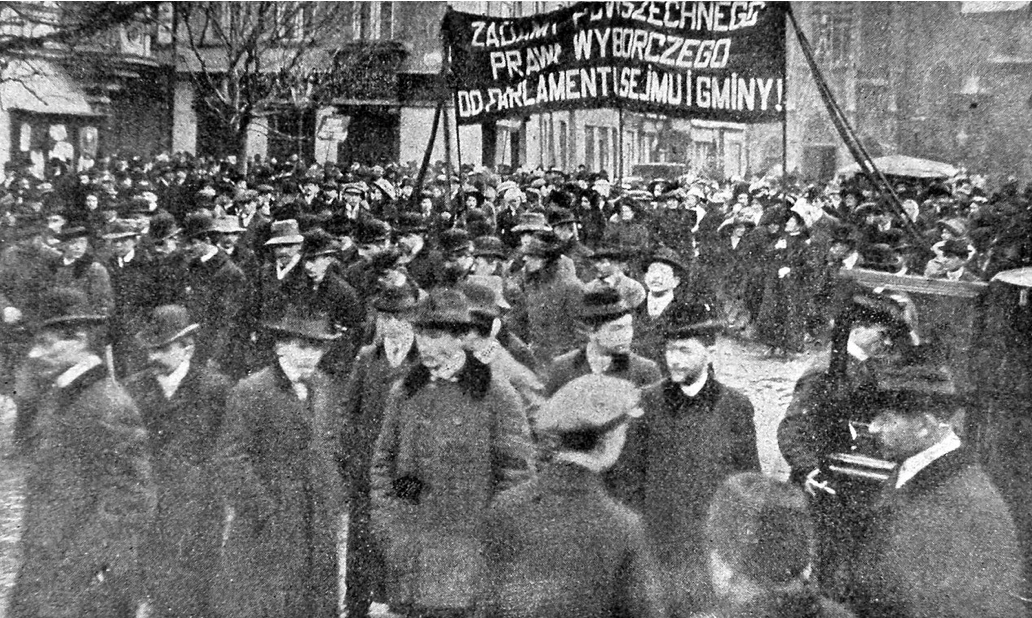
Source: historia.org.pl
November 28th marks a historic milestone of over a century of women’s voting rights in Poland, a relentless journey of empowerment and societal transformation. Delving into the triumphant struggle and profound impact of women’s suffrage in Poland unveils a narrative of resilience, activism, and the enduring pursuit of equality.
Demands for equal rights
This hard-fought achievement traces back to the 19th century, when Polish women, inspired by the movements in other countries around the world, began their fight for equality among genders. Polish women, in a then, non-existent Poland, started voicing their demands for equal rights. That, however, was much more complicated than for the suffragettes abroad.
Foreign women applied pressure on their respective governments, whereas Poles, had to fight on three different fronts. Poland at the time, was effaced off of the map, as Russia, Prussia and Austria took pieces to themselves. That made the strive for women’s rights significantly more difficult. The political situations of the three states widely varied, with which came a different way of establishing laws, as well as enforcing them.
What is also important to note, the amount of social backlash they received, as they stood up for their rights instead of focusing solely on gaining back the country’s independence. They however, believed that the two go hand in hand, claiming that an independent country means freedom and liberty for all, regardless of their gender.
Fight for independence
Women never disregarded the need for independence. In fact, they actively participated in the ongoing fight. As time when on, they began taking up jobs in male dominated sectors. There was a voluntary women’s legion created, where women took up fighting, dressed up as men. This was a way of women forcing out their rights, as they made great efforts to prove their worthiness, and ability to undertake jobs and activities usually assigned to men.
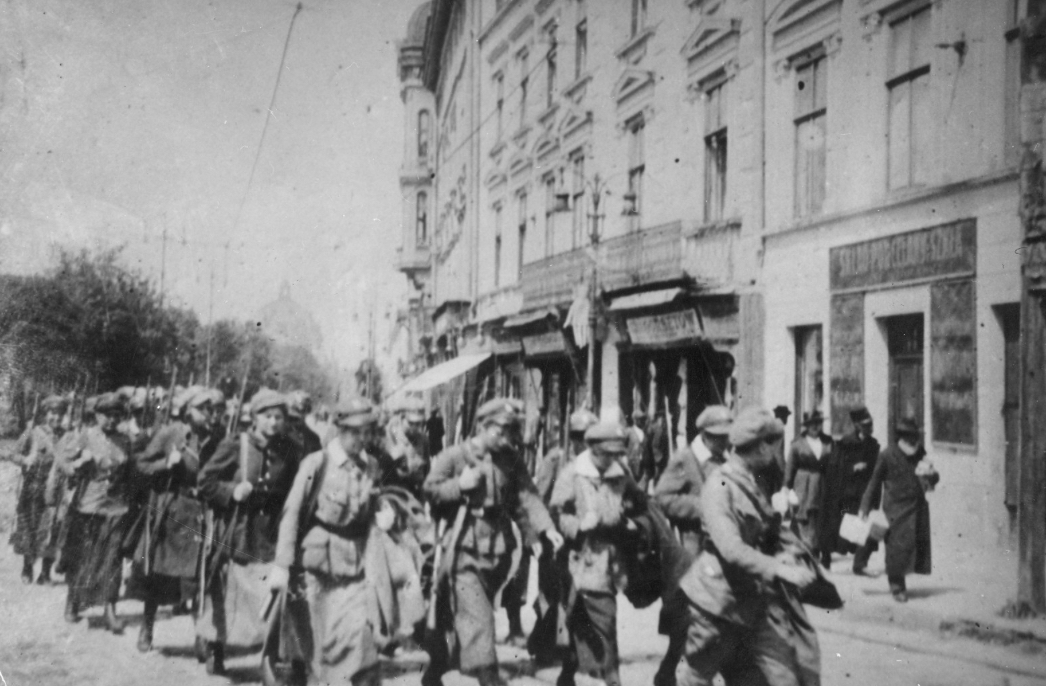
Source: www.prezydent.pl
With the 20th century, came new initiatives, the suffragettes wanted to make their case more heard. They published magazines, brochures, and created new organizations, namely, the Women’s Equality Union. The institution was formed by Paulina Kuczalska-Reinschmit, in 1907, the organization among other things, published a feminist magazine titled “Ster”.
This, as well as all the other efforts made, was meant to encourage women of all classes and backgrounds to participate in the movement. It was especially important as people in the emancipation movement were mainly upper-class women. The activists made sure to opt for sources all had access to, regardless of where they live.
Women in political parties
As the independence struggles gained strength, politics saw a surge in feminists’ participation. They co-founded political parties or joined the pre-existing ones such as Polish Socialist Party (Polska Partia Socialistyczna) and Polish People’s Party (Polskie Stronnictwo Ludowe). Women, in need of more publicity, decided to participate in the upcoming Sejm elections. They found a loophole in the law, particularly, the fact that no law deliberately stated that women can’t run for a position in the government.
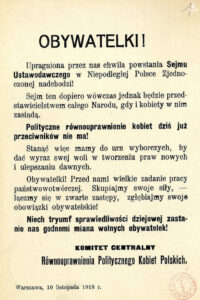
Source: www.prezydent.pl
The first woman candidate in Poland was Maria Dulębianka. Her and other women organized a campaign, handing out fliers, voicing their cause in various magazines and brochures. Even though she only ended up getting 500 votes, which was far from enough, it was the fact that she came forward that mattered. The emancipates wanted everyone to realize that they were serious about their case, and that they possess the skills needed to work at such establishment.
Since 1905, special meetings held called the Women’s Congress. It was a place for women activists to get together and discuss the current issues and the steps needed to resolve them. The most consequential meeting took place in 1917 in Warsaw. In the opening speech Justyna Budzińska-Tylicka asserted:
“The historical moment we are currently experiencing is too momentous for us women, us Poles, not to emphasize our position, define our tasks and demand the necessary legal and political reforms in the emerging Polish state. […] we also sincerely hope that representatives of our authorities and political parties will honestly emphasize their position on the women’s issue, which is no longer a narrow issue for fanatics, but is a historical necessity […] of the 20th century. Because just as there are no men’s congresses, there should be no women’s congresses if these women were not deprived of their human and civil rights.”
In November the following year that same committee which previously organized gatherings, turned to the government, wishing for a real solution. It was then that Józef Piłsudzki signed the decree stating voting rights for all, “regardless of their gender”.
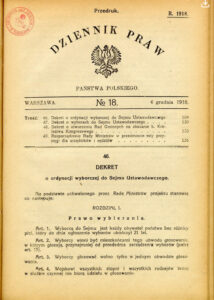
Source: historia.org.pl
The passage of the suffrage bill underscores Poland’s commitment to progress inequality. It stands as a testament to the tireless dedication of women and their allies who fought for justice, fairness and equal rights. With the newly acquired right to vote, polish women stood empowered to actively participate in the democratic process, amplifying their voices and issues ranging from social reforms to economic policies.
Women in the first elections
The first elections in an independent Poland took place in January 1919. Eight women in total made the government, namely, Gabriela Balicka, Zofia Moraczewska, Jadwiga Dziubińska, Anna Anastazja Piasecka, Zofia Sokolnicka, Maria Moczydłowska, Franciszka Wilczkowiakowa and Irena Kosmowska. Even though these women lacked previous experience, they were able to do their job well, owing to their earlier professions. They undertook key topics, such as equal rights to men and women, education for women, protecting women’s work against exploitation, and many others.
Despite facing considerable resistance and systematic barriers, these women persisted. The impact of their struggle extends beyond the ballot box, promising a more inclusive and equitable society, one where women’s voices are acknowledged and valued in shaping the nation’s future. This historic achievement will undoubtedly serve as an inspiration for future generations, reaffirming the power of unity determination and the unwavering pursuit of justice.
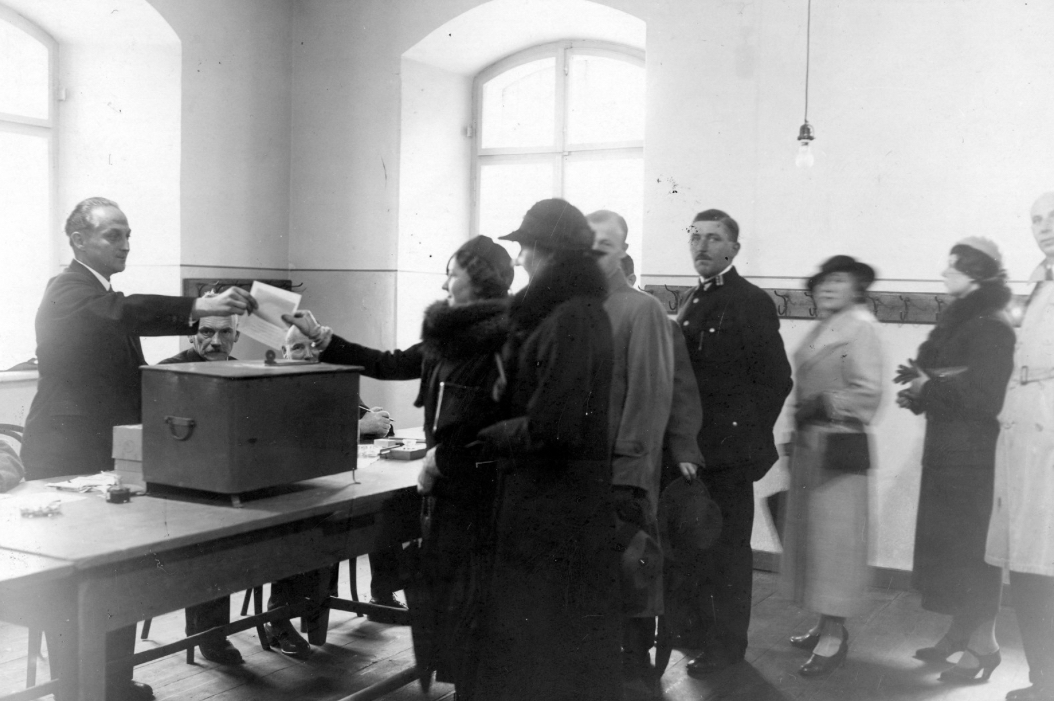
www.prezydent.pl
As the nation celebrates this momentous achievement, it also recognizes the ongoing work required to ensure a full realization of gender equality. The journey towards true parity continues fueled by the legacy of those who bravely stood for women’s rights, and the promise of a more inclusive future for all.
Klara Mikina, DP1
Sources:
• “Historia Walki o Prawa Wyborcze Kobiet w Polsce. Jak Polki Uzyskały Możliwość Głosowania?: Historia.Org.Pl – Historia, Kultura, Muzea, Matura, Rekonstrukcje I Recenzje Historyczne.” HISTORIA.Org.Pl, 3 Aug. 2021, historia.org.pl/2020/11/28/prawa-wyborcze-kobiet-w-polsce-jak-polki-uzyskaly-mozliwosc-glosowania/.
• “How Polish Women Won the Right to Vote – Video.” Culture.Pl, culture.pl/en/video/how-polish-women-won-the-right-to-vote. Accessed 19 Nov. 2023.
• Mg/lw. “Polish Women Gained Voting Rights 100 Years Ago.” TVP World – Poland and World Breaking, Daily & Top News, Telewizja Polska S.A, 18 Sept. 2019, tvpworld.com/40181751/polish-women-gained-voting-rights-100-years-ago.
• Podwójnie Wolne. 100 Lat Praw Wyborczych Kobiet w Polsce, www.prezydent.pl/aktualnosci/polityka-historyczna/100-rocznica-odzyskania-niepodleglosci-rp/aktualnosci/podwojnie-wolne-100-lat-praw-wyborczych-kobiet-,8274. Accessed 19 Nov. 2023.
• Polska.Pl, polska.pl/history/historical-events/100-years-womens-right-vote-poland/. Accessed 19 Nov. 2023.
• “Sto Lat Praw Wyborczych Polek.” Niepodległa – Świętujmy Razem!, niepodlegla.gov.pl/o-niepodleglej/sto-lat-praw-wyborczych-polek/. Accessed 19 Nov. 2023.